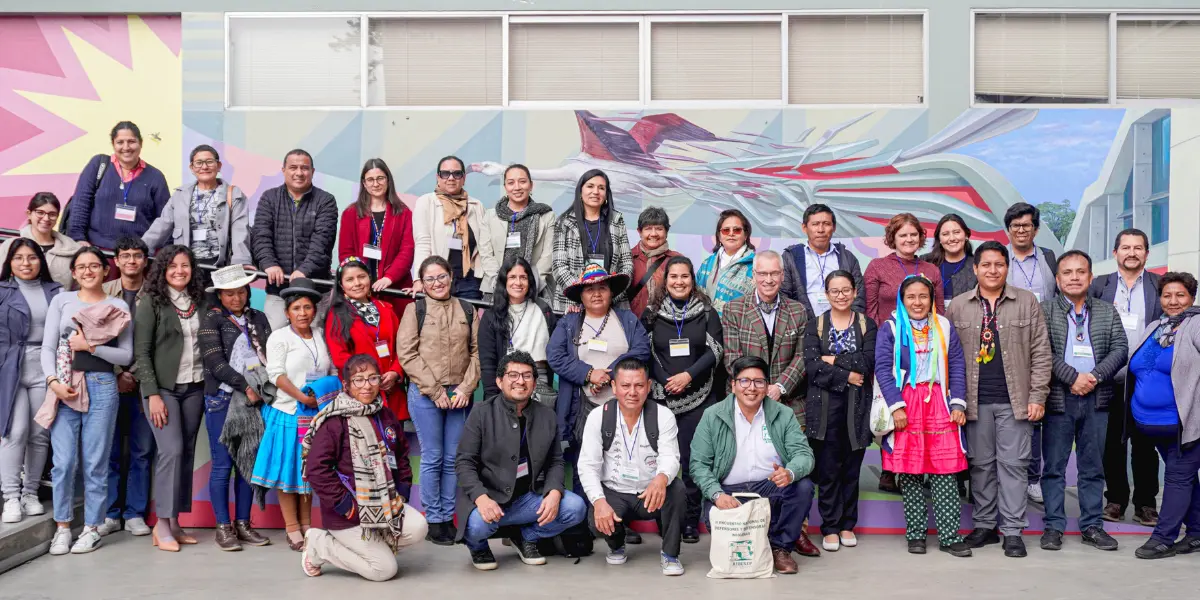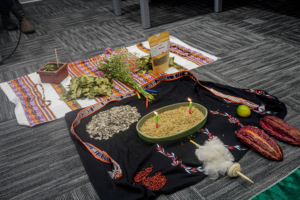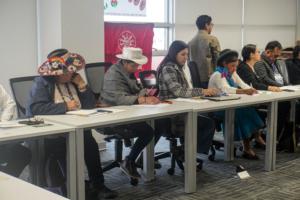National workshop focused on climate financing and Indigenous participation


The workshop addressed the participation of Indigenous Peoples in climate financing and the experiences of Indigenous economies in conservation, highlighting the need to integrate Indigenous knowledge systems and their practices in the pursuit of climate justice.
The workshop on conservation and the role of Indigenous Peoples began with an earth offering performed by Indigenous leaders. The day was divided into two main sections. In the first section, focused on climate financing and Indigenous participation, Juana Kuramoto from Profonanpe presented the climate financing architecture in Peru, detailing the amounts and destinations of funds since 2014, as well as the policies to strengthen Indigenous participation.

Una ofrenda a la tierra dio inicio a la jornada
Maritza Paredes from the PUCP Project addressed the mechanisms of Payment for Ecosystem Services (PES) in Peru from a climate justice perspective, comparing MERESE and REDD+, and analyzed their impact on Indigenous communities and the ways in which these mechanisms are contested.
The second section consisted of a climate fair that showcased experiences with direct financing.

At this fair, Indigenous organizations presented various projects. Nelsith Sangama and Eduardo Nugkuay from AIDESEP highlighted initiatives to strengthen Indigenous enterprises in crafts and tourism as measures for climate adaptation and Indigenous economy. Karen Valverde and Oseas Barbarán from CONAP presented projects focused on governance and territorial monitoring.
Ingrid Shiomara Yabar from the ECA Amarakaeri Communal Reserve presented the RED+RÍA project, focusing on the conservation of native territories and the co-management of conservation areas. Danitza Quispe from ONAMIAP emphasized the need to integrate ancestral knowledge into climate projects and the challenges related to Indigenous consultation and participation. Additionally, Lourdes Huanca de FEMUCARINAP presentó proyectos de empoderamiento económico para mujeres indígenas. Niria Altamirano de CNA abordó la promoción de la economía indígena y la adaptación al cambio climático. Elga Angulo de CCP mostró el proyecto «Sierra Productiva» y su enfoque en la agroecología, como un ejemplo de la economía indígena.
The group exhibitions included discussions specific to each sector. Ingrid Shiomara Yabar discussed the opportunities and challenges of mechanisms such as the Amazon Indigenous REDD+ (RIA), highlighting the importance of business plans, conservation, and ecotourism, as well as issues related to illegal activities and lack of transparency.
Danitza Quispe emphasized the relevance of ancestral practices and the need for climate projects to respect this knowledge, in addition to addressing issues with water resource management and the lack of prior consultation. Lily Rodríguez presented strategies to enhance benefits for Indigenous Peoples through the integration of jurisdictional planning, verification and safeguards, and a gender approach.
The workshop concluded with a valuable exchange on how to enhance the participation and benefits of Indigenous Peoples in environmental conservation, highlighting the need for collaboration and transparency in the implementation of climate projects.
RAZÓN SOCIAL: PONTIFICIA UNIVERSIDAD CATOLICA DEL PERU
RUC: 20155945860